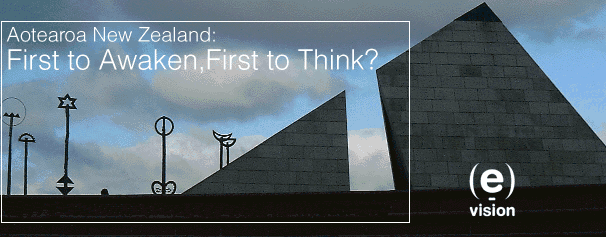
View of Wellington's City
to Sea Bridge and Para Matchitt's sculptures

View of Wellington's City
to Sea Bridge and Para Matchitt's sculptures
Facilitated by Lee Parkinson - General Manager Direct, Clemenger BBDO |
|||
| >
intro
> video
|
Friday 8
March
Theme:
Re-aligning Value for New Zealand
Keynote:
As media such as the Internet increasingly permit the flow of human attention from anywhere to anywhere on the globe, the international economy will be dominated by the fact the attention is intrinsically scarce. Money and material goods go primarily where the most attention goes, in a highly uneven distribution. For several reasons, far less attention per capita is likely to go to a country with New Zealand's characteristics than reaches say the San Francisco Bay Area (Michael's home). That could work to New Zealand's overall material detriment as well. Michael will suggest several broad scenarios through which the country might seek to do better, or, alternatively, do best with what it does get. Michael H. Goldhaber is a freelance analyst, writer, teacher and consultant on social, cultural and economic issues. Since 1990, he has been writing, lecturing, and consulting about the attention economy- a concept he originated - and its impact in all areas of life. Isolation and Opportunity for New Zealand Presentations:
John Blackham
Maui Solomon
Our isolation, once regarded as a problem, will be of immense value if we succeed in both attaining and maintaining visibility on the world stage. It is possible to live comfortably in New Zealand and take advantage of the time differences; working with partners abroad has never been as easy or advantageous. How does New Zealand recognise and realise its value(s) in terms of the global market? What opportunities does geographical isolation offer New Zealand? Old and New Authorities Presentations:
Dr Helen Anderson
Yadana Saw
So much of what was held in public hands, through Government ownership, now belongs in the hands of private enterprise driven by shareholder interests. Endemic restructuring has also resulted in the loss of institutional memory. It is no longer clear where the accountability lies for ensuring that public good is maintained. What is the new way of getting commitment and engagement from the citizen/consumer in this changed environment? How can we capitalise on the current wave of optimism and belief in New Zealand, its values and opportunities? Language as Facilitator Presentations:
Jill Van Nortwick
Professionals in the past used language as a tool to contain rather than share knowledge. Specialisation perpetuates this scenario, however, the new work environment requires a broader more inclusive dialogue that reaches across sectors. For all sectors to communicate freely there must be a genuine willingness to share information. If ideas and information seamlessly flow between different sector groups then the greater and more innovative the outcome for all concerned. How can new approaches to language make it possible to have a wider comprehension of specialist sector issues? Facilitated Discussion
Saturday 9 March Theme: NZ: An Ideas Driven Economy - Drivers of Future Success Presentation:
We need to ask what it is that New Zealand does uniquely. By identifying and improving our strengths we can better position ourselves globally. We recognise that New Zealand has been trying to do this, however we believe that something is still missing. Why is it that we are not doing better globally? What is our value proposition? Whilst recognising that creating a point of difference globally is important, within New Zealand we need to search for points of connectivity. We believe that the synergy New Zealand now needs to seek lies with the convergence of arts and culture, science, technology and innovation. Supporting an Innovative and Inclusive Culture Presentation:
What does sustained innovation look like? What is a culture of prosperity? A Multiple View for Business Presentations:
Rod Oram
Fiona Jack
A multiple view for business would seek to integrate different disciplines, create cohesion and capitalise on collective abilities. This view ideally has relevance and application across most sectors, and therefore requires new skills sets coupled with a broad understanding of your own and the wider working environment. Three speakers will address how they have integrated different disciplines to create successful, new business practices. Facilitated Discussion
(e)-vision, New Zealand's first Digital Media Centre, will host the First to Awaken, First to Think? Symposium March 8-9, 2002 The symposium will sit as part of (e)-vision's ongoing innovative programme and will be a forum for the exposure of the new media with a friendly interface. The ideas and concepts for the event have been generated and conceived by a working group constituted by (e)-vision staff and key individuals interested in promoting the broad aims of (e)-vision. This group works independently from (e)-vision. The current members of
this working group are :
Supporters : The First to Awaken, First to Think? symposium is generously supported by The Royal Society of New Zealand. Initial support for the symposium was given by Smart Wellington.
Copyright 2002 (e)-vision Digital Media Centre for Communication, Art & Technology, Wellington, New Zealand. |
||
| >
intro
> video |
|||